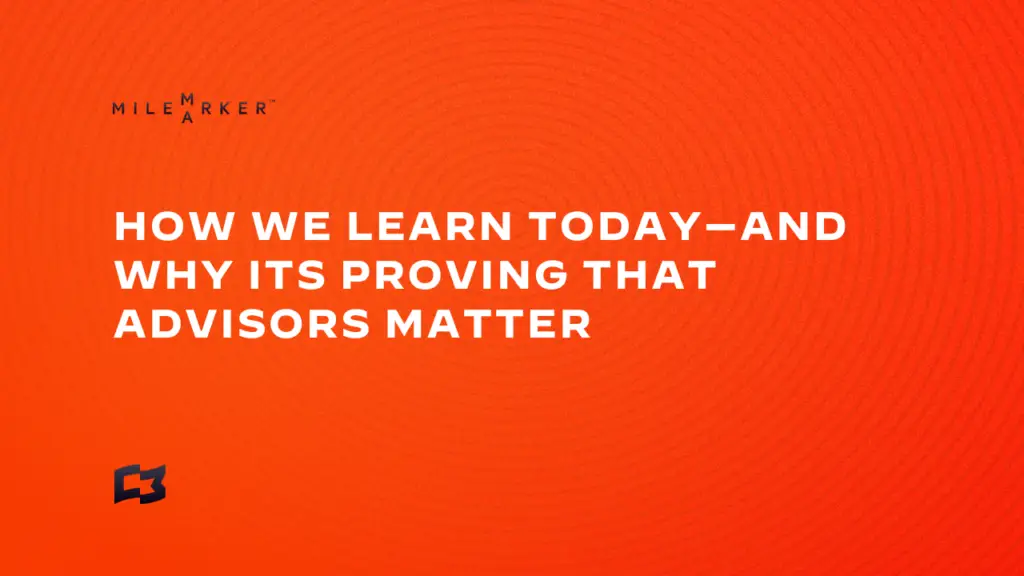A Columbia student admits 80% of his coursework is done by ChatGPT.
Not 8%.
Eighty.
It’s not just him. According to New York Magazine, students everywhere are outsourcing their thinking to AI. Papers, quizzes, entire assignments—written in seconds by a machine. Professors use their own AI tools to attempt to weed out work that wasn’t done by their students. Detection tools are glitchy. Policies are murky.
Everyone’s looking for shortcuts.
And no one knows what to do about it.
Here’s why it matters:
This isn’t just about education.
It’s about the world we’re all stepping into.
And more specifically—
It’s about why financial advisors are still irreplaceable.
It’s Not About the Work. It’s About the Thinking.
Since its inception, education has been obsessed with output. Somewhere over the past few decades, the US system began teaching to the test in a way that unraveled higher ordered thinking in a fairly palpable way. Standardized tests became financial drivers for school funding and teachers understood the assignment. Curriculum, teaching styles, the importance of being test ready increased dramatically.
In my case, the use of Turabian methodology within the Chicago Manual of Styleoften carried just as much weight as the substance of my work in Graduate school.
By the time students were in high school, they might know how to fill in the circles, but writing papers was the best way to really know if they understood.
And then came ChatGPT (and a host of other LLM-led applications).
Over the course of the last two years, in particular, the papers outlined, researched, and typed out started being less and less student-authored. You might find that depressing or relatable. It might make you wonder about our future as a society. ‘Will anyone even think at all in five years?‘
Do you remember when the internet first showed up on a paper you were writing? Did you cite a source with a link and have a TA, a teacher or professor that you ‘couldn’t do that?’ Did you push back and marvel at the antiquated process of note cards and quotes and encyclopedias you could only access in a library? We’re there again. We’re in the same moment of Herculean evidence to push us into a new way to educate and demonstrate knowledge.
Just like your 9th-grade English teacher couldn’t stop the world from citing internet sources, there’s not a professor on earth who can stop students from engaging with AI tools to work on their papers.
So the question will no longer be who can do the work.
The question is who knows what to ask.
Regurgitating facts has never been enough to demonstrate learning. It has always been about learning how to think. And thinking starts with asking better questions.
Enter the Financial Advisor
Anyone can generate a portfolio now.
Anyone can punch in a retirement number.
AI can spit out Monte Carlo simulations, tax strategies, even “custom” plans.
But here’s what AI can’t do:
– Ask a nervous 54-year-old what “freedom” actually means to them.
– Help a couple realize they’re not actually fighting about money—but control.
– Guide someone through a market crash without panic, shame, or confusion.
That takes a person.
A listener.
A guide.
An advisor.
Because when it comes to financial decisions, what people really need isn’t more information. It’s transformation.
And transformation doesn’t come from answers. It comes from the right questions.
Ask Better Questions → Build Better Outcomes
Toyota has a principle: ask “why” five times and you’ll find the root cause.
Apply that to advice:

The fifth “why” is usually where the truth lives.
We’re all tempted to stop at the first one.
But the best advisors keep going. They stay curious through the entirety of the relationship with their clients. They know that the uncertainty of life will keep throwing questions in the air and they know that those questions are just the beginning.
So How Do You Become That Kind of Advisor?
Here are five quick rules:
1. Obsess over the real problem.
Don’t settle for surface answers. Ask why until it gets uncomfortable.
2. Make curiosity your default mode.
You’re not the expert in them. They are. Let them teach you.
3. Ditch the script.
Authenticity > automation. Especially in money conversations.
4. Listen like it’s your job.
Because it is.
5. Remember: You’re not building plans. You’re buildin
Everyone can access the answers now. But very few people will be able to implement them.
That’s why you still matter.
That’s why you always will.

